Chapter 6: Interview With The Vampire, Episode 4: "...the ruthless pursuit of blood with all a child's demanding"
Claudia is reborn and has a lot to learn about her new life and death with her foster dads, experiencing the highs and lows of what it means to be a vampire.
“For a killing machine I kinda like her.” — Daniel Molloy
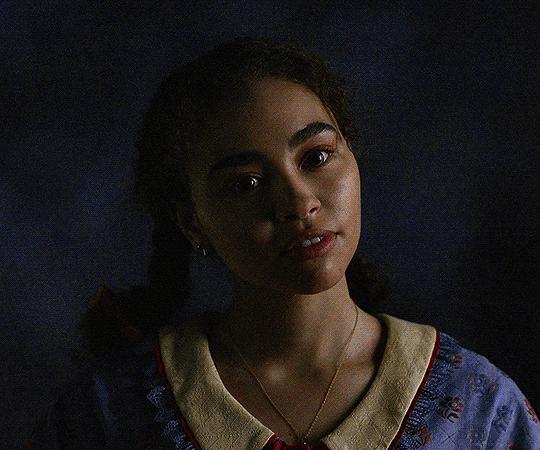
Welcome back to the fourth installment of my Interview with the Vampire recap for Spooky Season 2023! If you need a refresher of episodes one through three, please feel free to skim through the archives!
[spoilers from here on]
Wouldn’t it be crazy to see real evidence of documented vampires, especially from a first-person point of view? Daniel gets to read Claudia’s diaries that are kept in a vast, bright room with one tree inside—Louis’ way of bringing the natural world to him.
As we flashback to the late 1910s/early 1920s, this episode picks up again where we left off—Louis saving a child from a burning neighborhood. Louis is desperate for her not to die because it will relieve his guilt. Lestat shows again how he can’t say no to Louis, but we all know he secretly hopes this will keep Louis around forever, just like everything else he does for him. “More human entanglement,” Lestat says, reminding Louis that once again things could go very wrong by getting so involved with them.
“You were ready to abandon our home. Now you want a third?” — Lestat de Lioncourt
Lestat does it anyway, of course—anything for Louis! The scene of Lestat changing Claudia is expressed far more in their mannerisms than their words. Lestat’s face alone says so much: his pause with Louis before going through with it (Louis’ desperation speaks to him), his holding Louis back from Claudia when she first turns, and his awe of her when she asks Louis for his blood. He tells Claudia that she’ll learn his powers, that he’ll teach her everything she needs to know, exerting his stance as the head of the household. But Claudia and Louis have their own power apart from Lestat: they can hear each other’s thoughts, while he can’t hear either of theirs. They quickly decide to be a family with no secrets, and Lestat genuinely looks happy, excited almost, to have not only Louis but also Claudia.
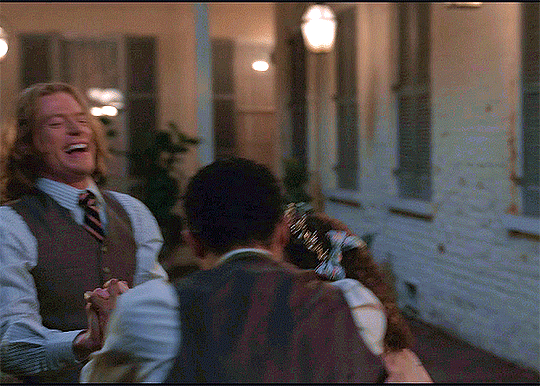
Welcome to the family, Claudia! She’s eager to learn everything about her new life (and is handling this sudden change suspiciously well), and Lestat and Louis are adorable teaching dads vs. “masters” as they’re described in the book. Claudia isn’t a “fledgling,” she’s a daughter and taken in with love. We quickly learn she takes after Lestat, fully engulfed in her “true nature,” already seducing a kill immediately—and no regular kill, but a police officer. In the book, Claudia is five years old and as she grows mentally and emotionally older she remarks that she never had any humanity because she was too young to learn it. In the show, she’s fourteen, and Lestat notes her young girl’s metabolism is how her hunger will remain, which gives reason instead to why she’s such a vicious killer (vs. having no humanity, like book-Claudia).
The beginning of Claudia’s vampire life is a nice reprieve from the heavy plots we’ve been through so far, and seeing the three of them as a family, even with Lestat’s playful exasperation, is fun for the audience. Like truly, so many small, wonderful moments. “Why does she talk to the book?” - “The book is my friend!” - “The book is her friend!” Louis, aka Daddy Lou, is adorable with her. Aside from episode 1, this might be my favorite episode. I could watch them enjoying their life together for a lot longer than we get to, and this upbeat atmosphere works to show us how a teenager might handle becoming a vampire. There is less thought to consequence; instead, it could possibly feel fun or exciting to have that much power so young—like a “hell demon” superhero.
In typical teenager fashion, Claudia already begins to ask a lot of questions, even asking Lestat who made him (wouldn’t we all like to know??? 👀). Louis understands her and reminds a tired Lestat that he’s forgotten what it’s like to be young—exactly as I noted in last episode’s article. It’s fun to watch them play together, shop for coffins, kill, and even bicker together playfully. We even get to see Louis and Lestat happy again, romantically climbing into each other’s coffins. Louis even says, “I missed you,” to Lestat as he joins Louis once Claudia gets her own coffin.
“Sometimes old people don’t like talking much about the past. Sometimes, you gotta be careful where you dig, you understand?” — Louis de Pointe du Lac
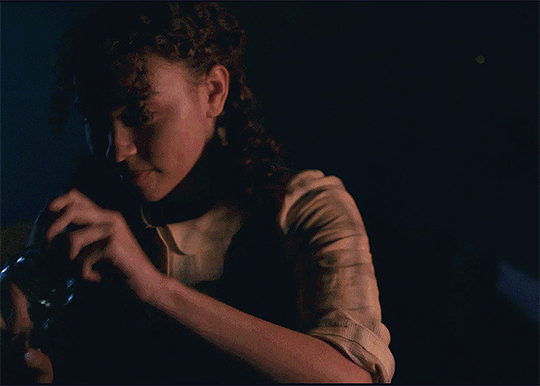
Claudia quickly observes that Uncle Les “keeps secrets” because he withholds information about vampires and powers. The scene between her and Louis on the bayou is a sweet kind of father-daughter moment. I love the moment when Louis is telling her about her origin story and she asks then what? and he says, “Then you,” and Claudia shows the sweetest joy in her response, bashfully recoiling into herself. They bond through the true intimacy of conversation.

Louis teaches her as a father would: That killing can have consequences, and that you can kill quickly or slowly. Claudia goes deeper, asking what it’s like when men love each other. Louis answers that it “feels like love” with a bit of a shrug, further normalizing the queerness in our reality and on screen. This is another example of how this show seamlessly includes sexuality and race as a natural and normal part of our existence. The storytelling is dynamic and the writers successfully layer joy amidst trauma, tenderness amongst fear, and a young girl’s vampiric puberty as she asks Daddy Lou when she’s going to grow into a necklace they gift her.
“Kill, spend. Kill, spend. Then the next thing you know the leaves are turnin’. Of course, Daddy and Uncle have problems, plenty of ‘em, but they figure ‘em out quick most times. And when they can’t, I can always get in between and make it right. We do like mortals do. We fight, we eat, we laugh, we sleep, we love.”
— Claudia
Claudia's narration through her diaries is an effective storytelling device. Not only does it refresh us for a moment out of Louis’ side of this story, but it also allows us to see and hear this story from another perspective, especially since it’s mainly from Louis. Daniel must revel in this as a journalist, but it adds more depth to the story we get to watch as an audience. The quote above is told over the moment when they’re at the movies together watching Nosferatu, a special scene of a familial… well, not quite bliss, but their version of a honeymoon phase.
What Claudia says here reminds us of their humanity while also giving way to a potentially unhealthy dynamic. A child should never have to mediate between their parents and this alludes to complicated dynamics to come. I love that here, even Lestat is able to play with them, which I think is good and healing for him. It’s likely he has never had relationships where he could be this silly and let his inner child roam free. For all we know, Lestat has been in survival mode since he was turned, despite how relaxed he seems at times.
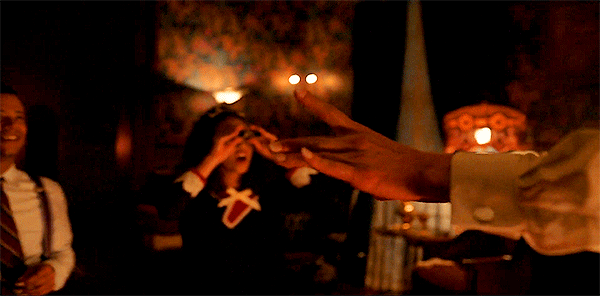
But then Louis’ mom dies and Claudia notes that that’s when the good times stopped. Louis is cold with Grace when he sees her at their mother’s wake and even threatens her. While he clearly feels empowered with his new family by his side, a whole unit, it’s clear that he’s hurt by all that’s happened between his mortal family. If Louis mourns his mother, as I’m sure he does, most of it is done off-screen and I imagine a part of him is relieved to have some closure on a relationship that hurt him deeply. On the flip side, Claudia seems emotionally void about the death of Louis’ mother, despite who she is and the way Claudia cares for Louis. This is a good example of Claudia’s ruthlessness in general, her vampiric nature overpowering her previous humanity.

While Louis shares his sweet moment with Claudia on the bayou while the good times are rolling, we don’t see Claudia share a one-on-one moment with Lestat until the tides have shifted. She bonds with Louis on possibly the most human parts of them, while she bonds with Lestat through killing. While Louis is a protective figure for her, Lestat encourages her “prodigious killer” potential. At Lovers Lane, Lestat teaches Claudia the intricacies of killing. As Claudia looks upon her next victims, she appears fascinated, almost coveting what they’re doing in the car with each other. She realizes she’s not the same young girl she was when Louis found her. Puberty is hard enough for a human, but this episode shows exactly how challenging it would be as a vampire. Louis and Lestat didn’t exactly adopt a child, they adopted a teenager, and vampirism just exacerbates what she was likely already beginning to experience. Louis and Lestat argue over how to raise her, and many of the instances we see of their family feel very human-like. I’m sure this feels special to Louis as he can actually have a semblance of what he feared he wouldn’t.
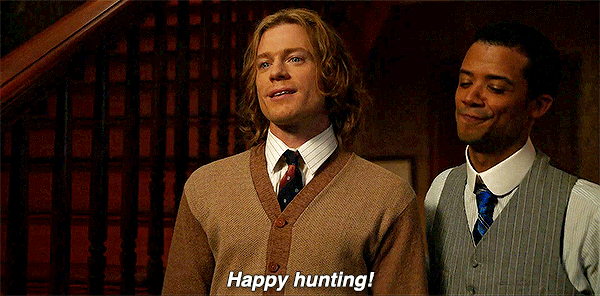
Claudia is excited about her next chapter as a young woman with freedom, beauty, and a new crush on a boy who works in her neighborhood. A boy who looks after her and immediately shows her chivalry and care—the first she’s experienced as far as we know. As Claudia steps into the world on her own one night, she doesn’t see the world like Louis OR Lestat—she’s not a man, she’s not white—she’s a young Black woman. Louis won’t experience the same kind of bullying and racism that she receives at the hands of white women around her age (or a little older, it seems), and she won’t experience her first love the same way since she’s already turned. These are things Louis was likely hoping to protect her from, but just like in our reality, we can’t protect our children from life itself, and them being vampires doesn’t mean they won’t have human experiences, they just won’t in the same way.
Claudia was… everything. I loved her unconditionally. All the noise, the chaos, the crisis of my former existence, silenced. The simple joy of her hand in mine. – Louis de Pointe du Lac
Claudia experiences her first trauma as a vampire with the accidental killing of Charlie after only one date, but not her first as a girl or young woman. As we learn later, Claudia has experienced trauma all of her life. As Louis says, all vampires are born of trauma. Maybe those who’ve experienced life trauma as humans are more inclined to become vampires. Maybe those who’ve experienced trauma are more drawn to vampires as mythical creatures who are dark, complex, and wounded.
Louis is much more compassionate than Lestat who is more focused on her mistake. “It’s easy to get carried away when you’re young and in love,” Lestat says. He tries to set boundaries by asking her to clean up after herself, encouraging independence, but his cruelty is what sticks. His initial statement sounds sincere but then he grows cold when consoling her. Not only stern, he brutally makes her watch Charlie burn in the incinerator. This experience of Claudia’s arguably did not require Lestat’s tough love to harden her heart by saying, “This is why we never get close to mortals.” This was a moment where Louis’ gentle touch was needed but also rejected when he tried. Her loss is heartbreaking for many reasons. Her guilt and because of what she feels she will never have. Louis tries to tell her, “It’ll pass, you have us,” but in very teenage fashion she replies, “I don’t want you.”
Daniel’s reaction after reading about Lestat forcing Claudia to watch Charlie burn distances us from the emotional height of the moment and brings us back to the present. The end of this episode is particularly impactful. While Louis is a companion of Claudia in the books, and even in love with her (has raised my eyebrow multiple times while reading)—in the show he is clearly a father figure, even like an older brother—regardless, he’s her guardian and protector. He’s all of the above but he truly cherishes her, so much so that when Daniel wonders (as the audience might wonder), why weren’t these diaries around in the 70s? and calls bullshit to Louis saying they were scattered, it’s clear that Louis was protecting her. His own guilt is apparent now, clapping back to Daniel that if he could look in his daughter’s diaries and find exactly when and how he failed them, would he want to share that with a reporter, let alone anyone? And where is Claudia now? Well, if you’ve seen the movie or read the book, you know.
It’s funnier when they fight in French. And, diary, you’d think a girl whose mama died in childbirth, whose daddy gave her away to a mean old auntie who beat her ‘cause no one said she couldn’t, who died in a fire but came back by the blood magic of two demons, well, you’d think that girl wouldn’t know what funny was. But you’d be wrong, diary. And if I told you, dumb diary, that that same girl was being raised to kill like her demon parents did, to take two souls a day so she could stay in the same flat-chested, hairless-crotched 14-year-old baby doll body as her mind and spirit turn 19, 20, 25, 63, 358, you dumb, dumb diary, I bet you’d say to anyone who’d listen, ‘Fun? Fun? How does she even get up in the morning?’ Well, let me tell you something, you stuck-up, flower-covered, three-dollar fancy fucking paper diary, I’m doin’ just fine. And how do I know that? ‘Cause the first man I killed called me the devil, and the last boy I killed, the last boy I’ll ever love in this world, called me an angel. So, that means I’m on the right path. And that means there’s so much more fun out there to have. I’m just getting started.
Okay, Ellen Burgess (she wrote this episode)!!!! That monologue was absolutely… whew. I imagine that most of us have experienced this—or almost this—level of manicness in our adolescence, maybe even a bit older. And if you didn’t or haven’t, consider yourself lucky. Even though we can’t relate directly to what Claudia is experiencing, anyone who’s been a young woman can relate to the emotions behind it. The angst is bad enough as a mortal, but everything is all the more intense as a vampire. And don’t underestimate the emotional range of a teenage girl, no matter what she is. Anyone in tune with the many younger versions of themselves can feel the palpability of this moment for Claudia. Between the writing, the acting of Baily Bass, the music, and the visuals, it all comes impactfully together to make the audience feel the depth of Claudia’s anguish in a short span of time.
The fade from Lestat and Louis arguing about their parenting styles again to Claudia’s monologue shows the chaos erupting again. The “Fantasy of Happiness” has burst, as Louis says. Claudia is having her dark night of the soul now. In a powerful moment, Claudia punishes herself by putting her arm in the sunlight—like a vamp teen girl’s version of cutting. She has mentally experienced puberty at a rapid rate, is processing the fact that she killed her first love, deals with two foster parents who have their own issues, processing that she’s not even a human anymore but now a vampire… I mean, it’s a lot to take in, and she took it in stride for much of the beginning of it. Now as it all settles and comes to a head, what is next for this sweet-at-times but very dysfunctional family? Louis accepts Daniel’s judgment that Claudia was “a bandaid for a shitty marriage” but says he was going to say something else. Although we don’t get to know, it’s easy to infer. He’s already shown how important Claudia is to him.
I like that we get an episode mostly dedicated to Claudia’s origins and the beginning of her vampire life. We still learn a lot about Loustat through Louis’ eyes and her diaries, but the focus being on her feels right. Claudia is an important part of Louis’ story, perhaps even Lestat’s, not to mention the show version of her (Like the show version of Louis) adds so much to her as a character, allowing a fully-fleshed out girl/woman/vampire queen to exist in this man’s vampire world! And there is much more to come….
Your turn…
Does Lestat have the patience to take a second vampire through this phase of death?
Will Lestat and Louis remain happy or will their problems overcome them, and how will that impact Claudia?
What stood out to you in this episode?
Why do you think Daniel is taking notes on Rashid in the beginning? Why is he so suspicious of him?
What was Louis going to say?!
Please enjoy this amazing art of our three favorite vampires. ‘Til next week!
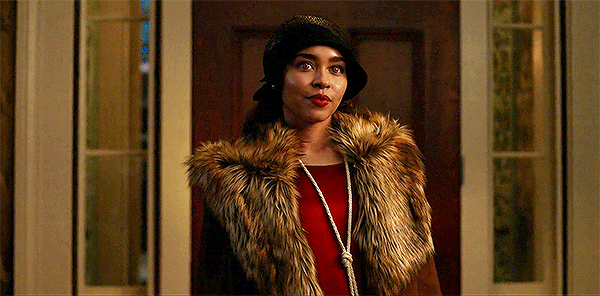




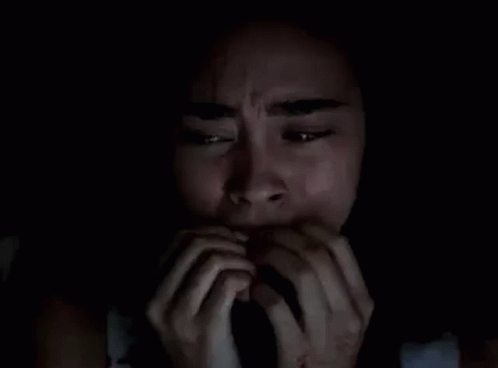
Your questions are so good!!
Regarding why Daniel is taking notes on Rashid, I think it's partially due to the questions that arise from the nature of Rashid and Louis' relationship and what it means to be a vampire's right hand. But I also think he's sensed something off about Rashid. I didn't catch it on my first watch, but I cracked up this time around when hearing Rashid refer to email as one's "electronic mailbox," and I paused on Daniel's computer screen of notes to see that that was his most recent question -- does Louis enforce this kind of language? Why would anyone say that to describe something ubiquitous? His comment about Dubai was a bit strange, too.
The question about Lestat and his patience has caused me to go down a few different rabbit holes of answers. It's a tricky one. It seems that Lestat gets a lot of pleasure from teaching Claudia how to hunt. If this were the most intimate their relationship got, he'd be content. I can imagine him teaching tons of fledgling vampires the basics; maybe he has done this many times throughout his life. I think it's her relationship with Louis that he doesn't have the patience for, especially when Louis was supposed to be his. Lestat struggles with intimacy but was able to create a kind of safe haven with Louis that is slowly becoming compromised by this new creature, who threatens to tear it apart--through the fact that she and Louis can communicate without Lestat knowing, and that she's created rifts between Louis and Lestat regarding their "parenting" styles that end up revealing more about Loustat's incompatibilities. And he only created Claudia for Louis! Poor Lestat :'(